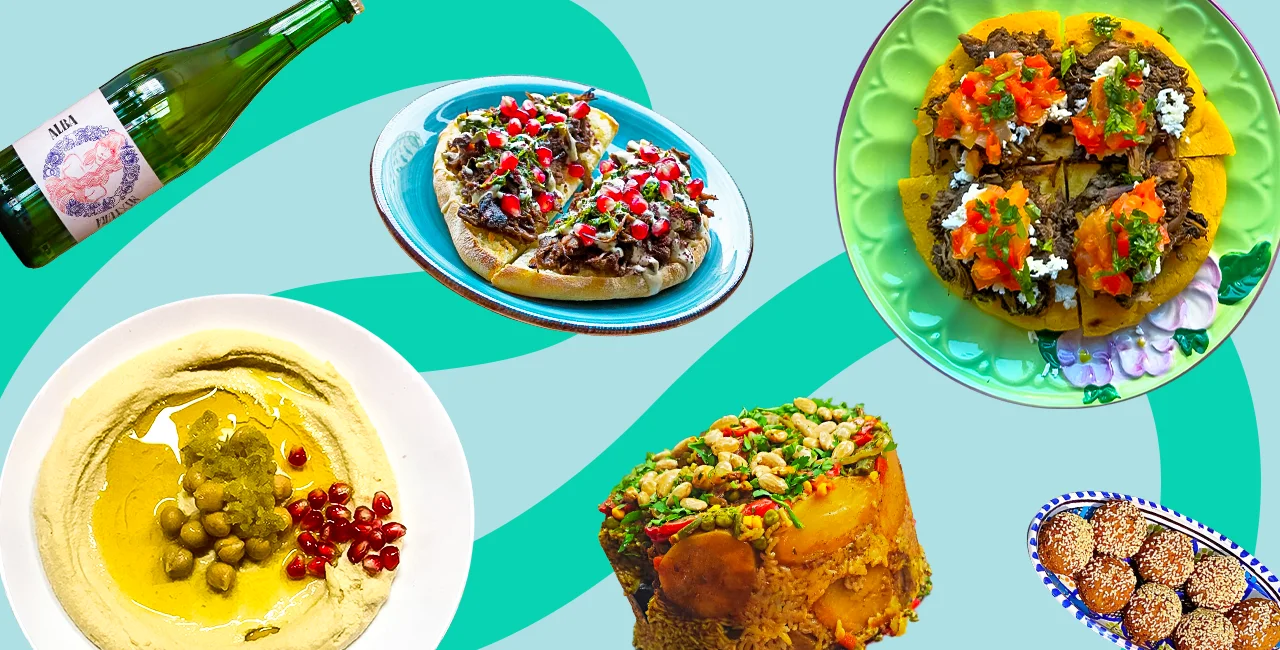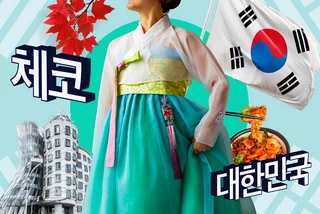“There aren’t too many places offering good Middle Eastern cuisine in Prague. And the few here are very traditional, both in their cuisine and presentation,” Farah, a 31-year-old Palestinian-Lebanese filmmaker, writer, and producer who has been living in Prague for over seven years, tells us as we visit her brand-new bistro.
Opened in March, Aleb – meaning "heart" in Arabic – is a small restaurant and natural wine bar nestled at the corner of the Londýnská and Jugoslávská streets in the Vinohrady district. As soon as you set foot through the door, you will experience warmth and hospitality.
“The main idea is to offer a fresh perspective on Middle Eastern cuisine, combining it with natural wines while creating a cultural space where people can meet, chill, and talk,” Farah explains.
Farah and Diana: Students with a delicious vision
True to its spirit of diversity, tolerance, and openness, Aleb is the brainchild of Farah –currently finishing her master’s in film directing at the Film and TV School of the Academy of Performing Arts in Prague (FAMU) – and her best friend Diana, who originally comes from the Syrian city of Aleppo and is now completing her PhD in architecture at the Czech Technical University.
“This place reflects who we are as human beings and how much we cherish our food and culture,” Farah explained in a recent interview with Radio Prague. “As Palestinians and Lebanese people, we want others to know that there are so many deeper levels to who we are – it’s not just about war and conflict.”

Although Diana humbly refuses to call herself a chef, she’s the one steering Aleb’s ever-evolving menu, constantly experimenting with new recipes, combining flavors, and taking in customer feedback. The result is original and exciting new dishes, blending cuisine from Palestine, Lebanon, Syria, or Jordan – always with a keen focus on organic and natural products as well as nutrition, digestion, and overall mood and wellbeing.
“People from Aleppo are known to be the best cooks in the Middle East,” reveals Farah, a statement Diana proudly confirms: “Aleppians are very picky and crafty with their cuisine. It’s in their DNA. They always like to elevate the flavors and love to create new things.” She admits that while she often used to cook for her family, she has never done it “with such passion” as now with Aleb.
Yazan: Healing mezze from a tiny kitchen
This cooking passion is shared by Yazan, the owner of Prague’s first authentic Jordanian restaurant in a quiet street in the Vyšehrad district. Now catering to a diverse crowd of expats and tourists, Bistro Habibi (not to be confused with the similar-sounding Habibi Restaurant in the center of Prague) offers a mouthwatering and season-changing offer of local meals, with the mezze – a multi-plate array of various starters and appetizers – the clear front-runner for customers curious to try a bit of everything.

A former pharmacist and yoga instructor, 39-year-old Yazan manages this little piece of Jordan at the heart of Prague almost singlehandedly, occasionally seconded in the kitchen by Cambridge-born and part-time English teacher Olivia and a few others.
“People coming to eat here keep telling us they don’t feel like they are in Prague anymore, that they feel as if they’re traveling directly to Jordan,” Yazan says.
Whether he imports specialties, like local Jordanian wines and spices, directly from the Middle East or brings his produce from Berlin, he always focuses on providing meals with wholesome health benefits and healing properties – for mind, body, and soul.

“It feels like home here,” Yazan tells us as he prepares a knafeh, one of Jordan’s most beloved sweet delicacies, and other dishes for the birthday party of an Egyptian neighbor later that afternoon. I love creating a place open for everyone, where I can see people’s instant reactions to the food I bring them, their faces smiling more, their mood improved, their conversation livelier.”
TIP: We asked Obada, a Palestinian-born student at Charles University in Prague, about his favorite food spot since he moved to Czechia. He suggested Muj Falafel, a Lebanese vendor in Kutná Hora, which frequently appears at festivals and events around Prague. For Obada, the falafel wrap made a lasting impression. You can catch Muj Falafel at Dyzajn Market this weekend, May 18-19, at Výstaviště.
From labneh to Levantine-flavored ice cream
Still, in its soft opening phase with new recipes being tested and adjusted, Aleb’s menu is intended to change seasonally, something quite common in Middle Eastern cuisine. Some of its specialties, however, including the current all-time favorite lamb platter or sandwich – a meat rarely found in Prague – are likely to remain year-round. “A few items are still missing, but our spring menu is pretty much finalized,” Diana tells us.
A menu we gladly start sampling as the discussion moves forward, with the muhammara and labneh dips soon making way for an exquisitely fresh orange salad, a soft-as-they-come lamb sandwich, and a unique Levantine-flavored ice cream – the ingredients of which customers are encouraged to guess.
Prepared by Colombian cook Daniel under Diana’s watchful and detail-oriented eye, the feast is smoothed down with a selection of natural wines carefully picked out by Farah through her Moravian connections and brought by Aleb’s Russian-Ukrainian waiter Dimitri as he maneuvers around the large centerpiece table.
“This is where all the best discussions happen; it pulls people and strangers together,” Farah happily says, insisting that – on top of the delicious food and wines it offers – Aleb was also imagined as a cultural community and meeting space open to all.
Community tasting events tear down borders
“We have a very diverse crowd of people coming here; it’s been wonderful,” Farah tells us, “and the feedback about the food, the place, and the vibe has been absolutely great,” including through the events, food-themed evenings, and wine-tasting sessions they organize on a regular basis.
With its large street-side terrace, wide open window, and lean décor personalized with art, souvenirs, and photographs from Farah and Diana's family and home region, Aleb quickly evokes the shared sense of community, friendliness, and openness they were striving for.
“This place kind of became an extension of my living room,” Diana confides. “I was afraid my social life would be over when we started this venture, but not at all; my social life simply moved here,” happily echoes Farah.
Combining their various academic and professional activities with managing a restaurant is not easy, but Farah and Diana – who, despite moving in similar circles in Beirut, only met once they had both moved to Prague – are already brainstorming new endeavors to showcase their culture and “bring pieces of home here and twist them” to the local context.
One would be collaborating with local fashion designers to bring back an indispensable item of Middle Eastern clothing, the farweh coat, and adapt it to be more suited to the Czech and European context.
For now, however, the duo’s focus is on Aleb. “It’s essential that we’re always here since we just opened. Aleb is our first baby, so we must raise and nurture it for some time before even thinking of a second one,” Diana muses.
Following previous thematic nights, Aleb hosted a "From Gaza with Love" fundraiser event at the start of May. The event featured local Palestinian recipes, and part of the proceeds were donated to Doctors Without Borders.
On May 16, Farah and Diana will also host a wine-tasting session with food pairing with famous Moravian winemaker Petr Korab. “These events are great,” says Diana. “We create a food platter with small portions of different flavors that people freely combine and have fun with. How they react to it also inspires us; the plate is made in collaboration with everyone coming here.”
An exciting fusion night will be held the next day, May 17, blending the flavors of Palestine and Colombia (where cook Daniel is from). Next Friday (May 24), a Levantine-Yemeni fusion evening will follow.
At Bistro Habibi, Yazan, too, is keen to organize private and public events designed to bring people together and introduce different facets of Jordanian culture, from live music and dancing evenings to cooking classes. “Cooking in our culture is a very collective and hands-on activity,” Yazan explains. We ‘cook with our soul,’ as the expression goes.”
Thinking to the future
Part of the Hate Free network of Prague venues where everyone is welcome regardless of creed and belief, Bistro Habibi is also a partner of Místní místním (Locals for Locals), a solidarity network for people in need, echoing Yazan’s consistent efforts to welcome and serve the homeless in his restaurant.
Similarly to Farah and Diana, Yazan is also restless with new ideas. With his background as a pharmacist-yogi who has lived in India, Egypt, and Lebanon, he has, for instance, been toying with the idea of opening an alternative medicine shop in Prague.
“But right now, I have to give everything and commit 100 percent to Bistro Habibi,” he says. It’s really important to be content with what you have.”
Despite its recent opening, Aleb already has a promising base of regular and loyal visitors. As our discussion draws to a close, reservations for the evening are made, and the space slowly fills up with friends, neighbors, or newcomers.
“I love it here; I’ve been coming all the time since they opened,” Russian expat Veronika says as she takes a seat around Aleb’s large central table and prepares for a convivial evening of food, wine, and laughs.












 Reading time: 7 minutes
Reading time: 7 minutes 



















